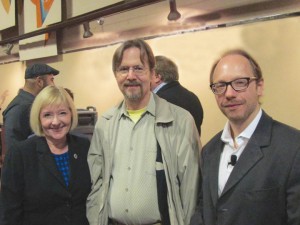Marine Vardanyan
Editor

2015 marks the 100th Anniversary of the Armenian Genocide. Why should you care? According to Dr. Sergio La Porta, Berberian Professor of Armenian Studies at Fresno State, the Armenian Genocide “is very much tied up with who we are today and the whole notion of modernity.” On Thursday, February 26, Dr. La Porta explored the role of the Armenian Genocide in shaping modern-day civilization at the Fresno State lecture series known as “Fresno State Talks.”
Dr. La Porta was among the three Fresno State professors selected to speak in this year’s series. Modeled after the well-known “Ted Talks,” nominations for the series are solicited from students by asking “What professor inspires you?” The series features three faculty members who exemplify the core values at Fresno State—Discovery, Diversity, and Distinction.
Dr. La Porta spoke on the topic of “Who Cares? Genocide, Historical Memory, and Moral Responsibility” and addressed the important role of the Genocide not only in the lives of Armenians, but for civilization at large. The Armenian Genocide was the first event of its kind in the 20th century, setting a path for how civilization would progress. Dr. La Porta touched on the paradigm of genocide, patterns such as dehumanization, systematic killings, deportations, and concentration camps. New inventions such as the telegraph and railway lines were also employed for purposes of mass extermination. Such patterns have been repeatedly observed throughout genocides of the 20th century.
While the massacre of the Armenian people was taking place, no appropriate term existed to describe the happenings. Thus, the events of 1915 played a large role in defining the term “genocide,” coined by Raphael Lemkin in 1944. Though the word “genocide” did not exist, the international community was well aware of the inhumane acts taking place in Ottoman Turkey.
Nearly 200 articles about the Genocide were published in The New York Times between 1915 and 1922, reports were published by missionaries, and U.S. Ambassador Henry Morgenthau wrote about his experience in the Ottoman Empire. Later one of the largest relief efforts mounted in the United States was launched by the Near East Relief Fund to help the Armenian people. The fund collected what is today the equivalent of 1.5 billion dollars.
Today, as denial of the Armenian Genocide continues, civilization faces a moral responsibility to remember and acknowledge the massacre of 1.5 million people.
Dr. La Porta stressed the importance of remembering as a vital part of being human. “Remembering is not stopping us from going forward. It’s the catalyst that allows us to engage in acts of humanity.”
 Hye Sharzhoom Armenian Action
Hye Sharzhoom Armenian Action